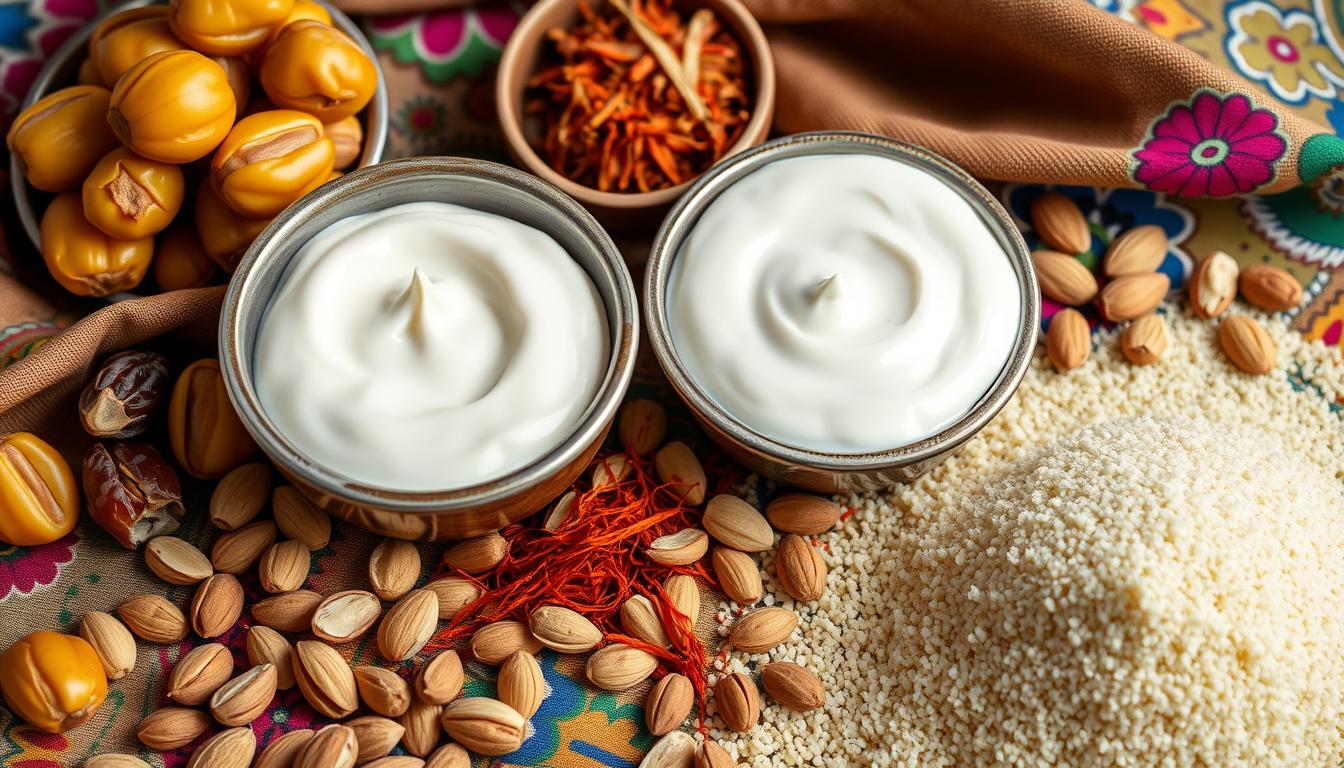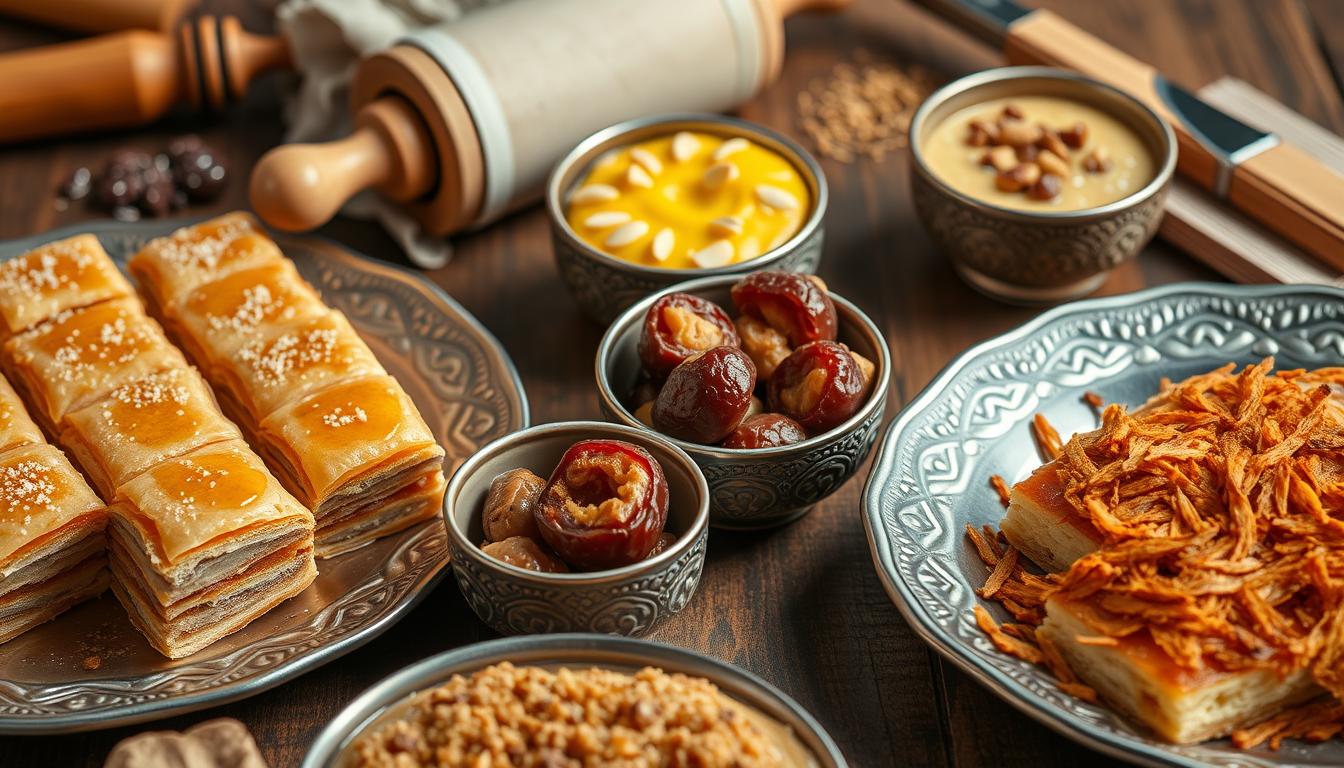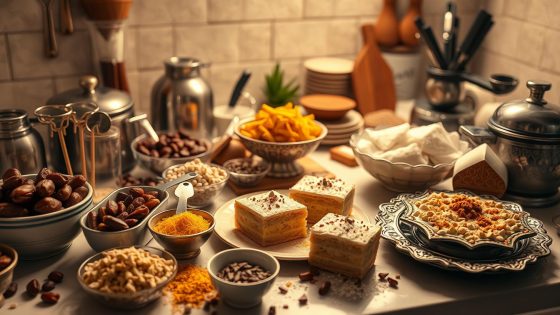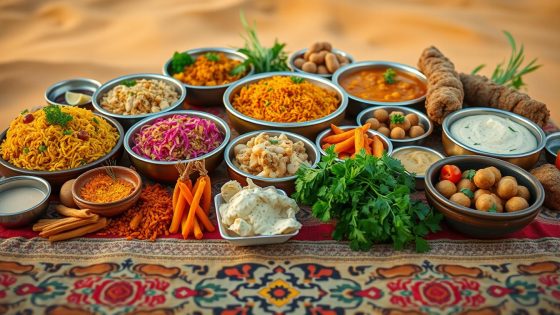Contents
UAE sweets are a treat for the senses. These dessert dishes blend rich flavors with unique textures, creating a taste of Emirati culture. From sweet dumplings to bread pudding, mastering these treats takes skill and know-how.
Baking tips for UAE desserts often include using local ingredients like dates, saffron, and rose water. These elements are key to nailing the authentic taste. Learning dessert techniques specific to Emirati sweets can help you create mouthwatering dishes at home.
Ready to dive into the world of UAE desserts? Let’s explore the secrets behind these sweet dishes and uncover the best dessert preparation methods.
Essential Ingredients for Emirati Desserts
Emirati dessert recipes blend traditional flavors with modern culinary sweets. The key to perfecting these treats lies in using the right ingredients. Let’s explore the essential components that make UAE desserts truly special.
Key Sweeteners: Dates and Honey
Dates are the heart of many Emirati desserts. They serve as both a sweetener and a main ingredient. Local varieties like Khalas, Fard, and Khnaizi add unique flavors to traditional desserts. Honey, another natural sweetener, brings a touch of golden sweetness to many recipes.
Spices That Elevate Flavors
Spices play a crucial role in Emirati baking secrets. Cardamom, saffron, and cinnamon are staples that add depth and warmth to desserts. Rose water and orange blossom water infuse delicate floral notes, creating unforgettable culinary experiences.

Ghee often replaces butter in Emirati sweets, lending a rich, nutty flavor. Nuts like pistachios and almonds provide texture and visual appeal. These ingredients come together to create indulgent treats that reflect the region’s culinary heritage.
| Ingredient | Role in Desserts | Common Uses |
|---|---|---|
| Dates | Sweetener, Main Ingredient | Mamoul, Date Cake |
| Honey | Natural Sweetener | Baklava, Luqaimat |
| Cardamom | Aromatic Spice | Umm Ali, Karak Chai |
| Rose Water | Floral Flavoring | Muhallabiya, Kunafa |
| Pistachios | Texture, Garnish | Baklava, Halwa |
Techniques for Traditional Desserts
Mastering dessert crafting in the UAE requires skill and precision. Let’s explore some key confectionery techniques for creating beloved sweet treats.
Perfecting Luqaimat
Luqaimat, a popular Emirati dessert, demands careful attention to texture. To achieve the perfect crispy exterior, maintain oil temperature at 350°F. Use a special batter dispenser for uniform dumplings. This pastry tip ensures consistent results every time.
Creating Creamy Umm Ali
Umm Ali, a rich bread pudding, calls for layering techniques. Tear puff pastry into pieces and layer with a milk and cream mixture. Add nuts between layers for extra texture. This method creates a delightful balance of creaminess and crunch.
Crafting Flaky Pastries
For flaky pastries like Qatayef, fold dough multiple times, brushing with ghee between layers. This pastry tip results in a light, crispy texture. Khanfaroush requires a specific batter consistency and careful deep-frying for its signature crunch.

| Dessert | Key Technique | Texture Goal |
|---|---|---|
| Luqaimat | Oil temperature control | Crispy exterior |
| Umm Ali | Layering | Creamy with crunchy bits |
| Qatayef | Multiple folding | Flaky layers |
| Khanfaroush | Batter consistency | Light and crunchy |
By mastering these confectionery techniques, you’ll elevate your dessert crafting skills and create authentic Emirati sweet treats that delight the senses.
Presentation Tips for Emirati Sweets
Elevate your UAE sweets to dessert perfection with these presentation tips. The visual appeal of sweet dishes plays a crucial role in the overall dining experience.
Decorative Serving Platters
Showcase your dessert preparation skills by using ornate metal or ceramic platters. These traditional serving dishes enhance the beauty of Emirati sweets, making them irresistible to guests.
Garnishing with Nuts and Dried Fruits
Add texture and visual interest to your sweet dishes by garnishing with chopped pistachios, almonds, or dried rose petals. These toppings not only look beautiful but also complement the flavors of UAE sweets.
Plating with Syrup for Added Appeal
Drizzle date syrup or honey in intricate patterns on the plate to enhance the presentation of your desserts. For Luqaimat, stack the dumplings in a pyramid shape and pour warm date syrup over them for a stunning effect.
| Dessert | Presentation Tip | Price |
|---|---|---|
| Number Cakes | Customize with seasonal fruits | 90€ |
| Letter Cakes | Decorate with edible flowers | 110€ |
| Heart-shaped Cake | Garnish with fresh strawberries | 120€ |
Remember, presentation is key to achieving dessert perfection. With these tips, your UAE sweets will not only taste delicious but look stunning too.
Mistakes to Avoid in Dessert Making
Creating perfect Emirati desserts requires skill and attention to detail. Let’s explore common pitfalls in dessert recipes and culinary sweets to help you master these delicious treats.
Overcooking or undercooking dough
One crucial baking tip is to nail the cooking time. For basbousa, a popular Middle Eastern dessert, bake at 180°C (350°F) for even cooking. The ideal ratio of fine to coarse semolina is about 70-30. This balance ensures a light, fluffy texture that’s neither too dry nor soggy.
Adding excessive sugar or spices
Emirati palates prefer subtle sweetness. When making sugar syrup for basbousa, use a mix of sugar, water, and fragrances like rosewater. For Dubai-inspired chocolate bars, blend premium cocoa beans with dates and spices. Brands like Valrhona, Guittard, and Callebaut are top choices for cocoa. Remember, less is often more when it comes to spices in dessert techniques.
Not following cooling instructions
Proper cooling is vital in dessert recipes. Allow treats like Umm Ali to cool fully before serving. This step helps set custards and prevents a runny texture. For homemade chocolates, tempering is key. Dark chocolate should be 88-91°F, while milk and white chocolate need 84-87°F. These dessert techniques ensure a smooth, shiny finish that lasts up to 6 months when stored correctly.













